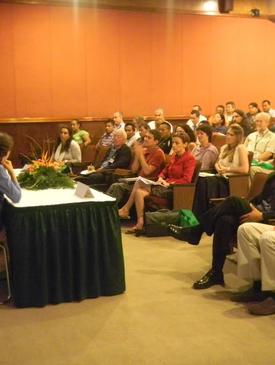Conference: REDD+: Technical, Socio-Economic, and Political Dimensions
Summary
This version of the annual ELTI-PRORENA conference explored the technical, socioeconomic, and political dimensions of REDD+ (Reducing Emissions from Deforestation and Forest Degradation ‘Plus’). If designed and implemented correctly, REDD+ has the potential to generate a valuable stream of funding for initiatives that will conserve and restore important tracts of tropical forests. Alternatively, if the mechanism fails to adequately address potential pitfalls, REDD+ could compromise local livelihoods, affect traditional uses of forests, and enhance or catalyze corruption, among other problems.
Panama has been actively engaged in international negotiations and debates regarding REDD+ and government officials, indigenous communities, NGOs, and organizations of farmers, cattle ranchers, loggers and other agents of land transformation have begun to participate in REDD+ discussions and/or trainings. Considering that REDD+ activities will likely be adopted by the UNFCCC in 2011 at COP-17 in South Africa, the time is ideal to host a national-level conference that addresses some of the key issues surrounding REDD+ in Panama and many other countries actively engaged in REDD+ preparations in the neotropics.
The Conference was free and open to the public.
Content
DAY 1. THURSDAY, APRIL 7
Welcome remarks: Dr. Eldredge Bermingham / Smithsonian Tropical Research Institute (STRI)
Opening Remarks: Licda. Lucia Chandeck / National Environmental Authority of Panama (ANAM)
Conference background and objectives: Javier Mateo-Vega / Environmental Leadership and Training Initiative (ELTI)
PANEL 1. REDD+: the Global Scheme and Panama
Emergence and evolution of REDD: from “Avoided Deforestation” to REDD+
Catherine Potvin / McGill University & Smithsonian Tropical Research Institute (STRI)
REDD+ in Panama
Félix Magallón / National Environmental Authority of Panama (ANAM)
PANEL 2. Technical Dimensions of REDD+
Climate change and forest carbon
Helene Muller-Landau / Smithsonian Tropical Research Institute (STRI)
Understanding the changes in forest carbon stocks in the tropics
Joseph Mascaro / Carnegie Institution for Science & Smithsonian Tropical Research Institute (STRI)
REDD+ technical requirements
Lucio Pedroni / Carbon Decisions Internacional
PANEL 3. Forest Governance and REDD+
Forest governance and REDD+: a global perspective
Benjamin Cashore / Yale University
Forest governance and REDD+ in Latin America & the Caribbean
Bastiaan Louman / Tropical Agronomic Center for Research and Teaching
Land & carbon tenure in Panama
Alexis Alvarado / Dobbo Yala Foundation
Closing remarks
Cecilia Del Cid-Liccardi / Environmental Leadership and Training Initiative (ELTI)
DAY 2. FRIDAY, APRIL 8
Welcome and summary of the conference’s 1st day: Jefferson Hall / Smithsonian Tropical Research Institute (STRI)
PANEL 4. Socioeconomic Dimensions of REDD+
REDD+ and forest-dwelling communities: a global perspective
Marina Campos / Rainforest Foundation
Indigenous perspectives on climate change and REDD+
Estebancio Castro / International Alliance of Indigenous and Tribal Peoples of Tropical Forests
Indigenous peoples of Panama and REDD+
Inocencio Martínez and Heraclio Herrera / National Coordinating Body of Indigenous Peoples of Panama (COONAPIP)
Net costs associated with REDD+
Rhett Butler / Mongabay.com
PANEL 5. REDD+: Beyond Avoided Deforestation
Biodiversity co-benefits & potential risks of REDD+
Percy Summers / Conservation International
Agroforestry as an effective tool for REDD+
Florencia Montagnini / Yale University
PANEL 6. REDD+ in Action
REDD+ Readiness
Gabriel Labbate and Gisele Didier / United Nations Environment Programme
REDD+ experiences from the field
Mariana Pavan / Institute for the Conservation and Sustainable Development of Amazonas (IDESAM)
REDD+ project certification standards
Lucio Pedroni / Carbon Decisions International
Monetizing carbon for voluntary markets
Tiffany Potter / EcoAnalytics
LOOKING AHEAD: REDD+ challenges and opportunities – international & regional perspectives
Catherine Potvin / McGill University & Smithsonian Tropical Research Institute (STRI)
Closing Remarks
Javier Mateo-Vega / Environmental Leadership and Training Initiative (ELTI)


